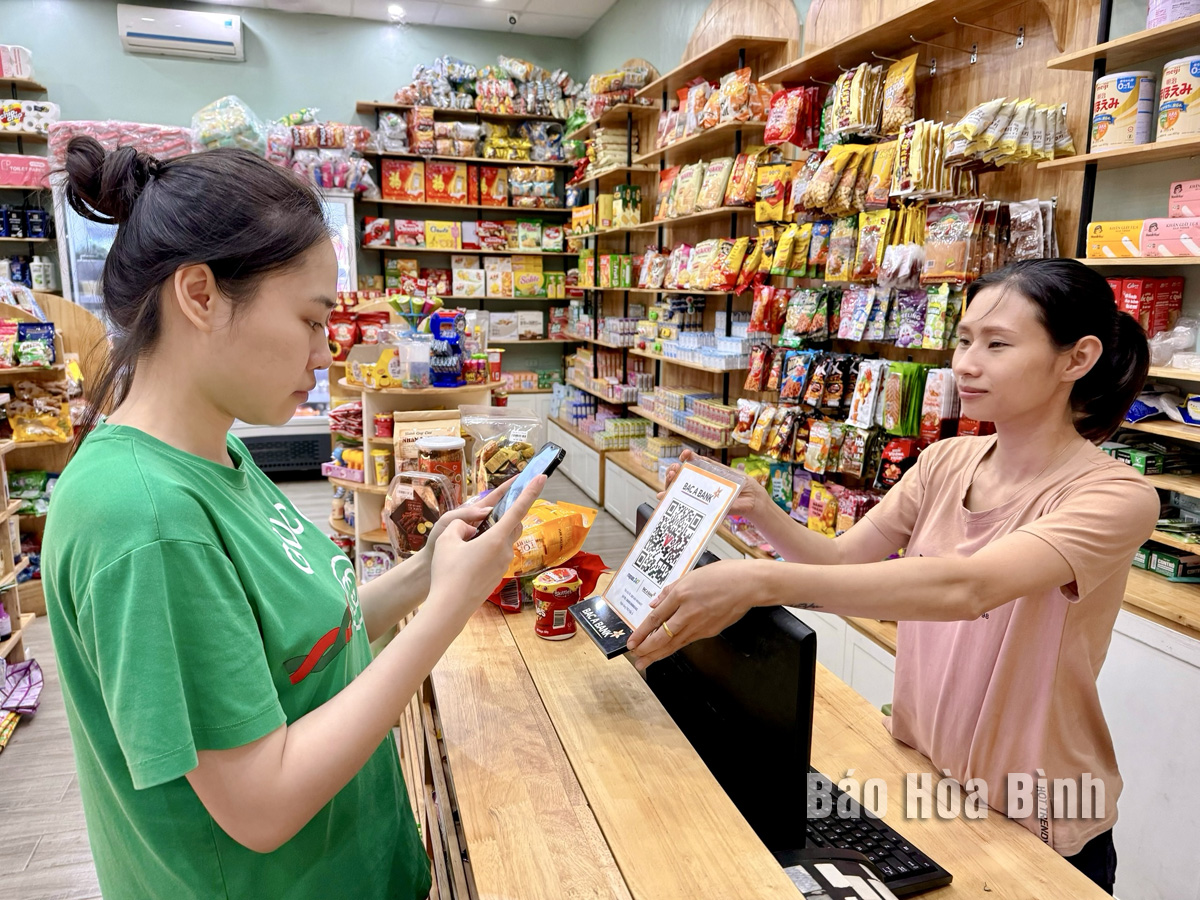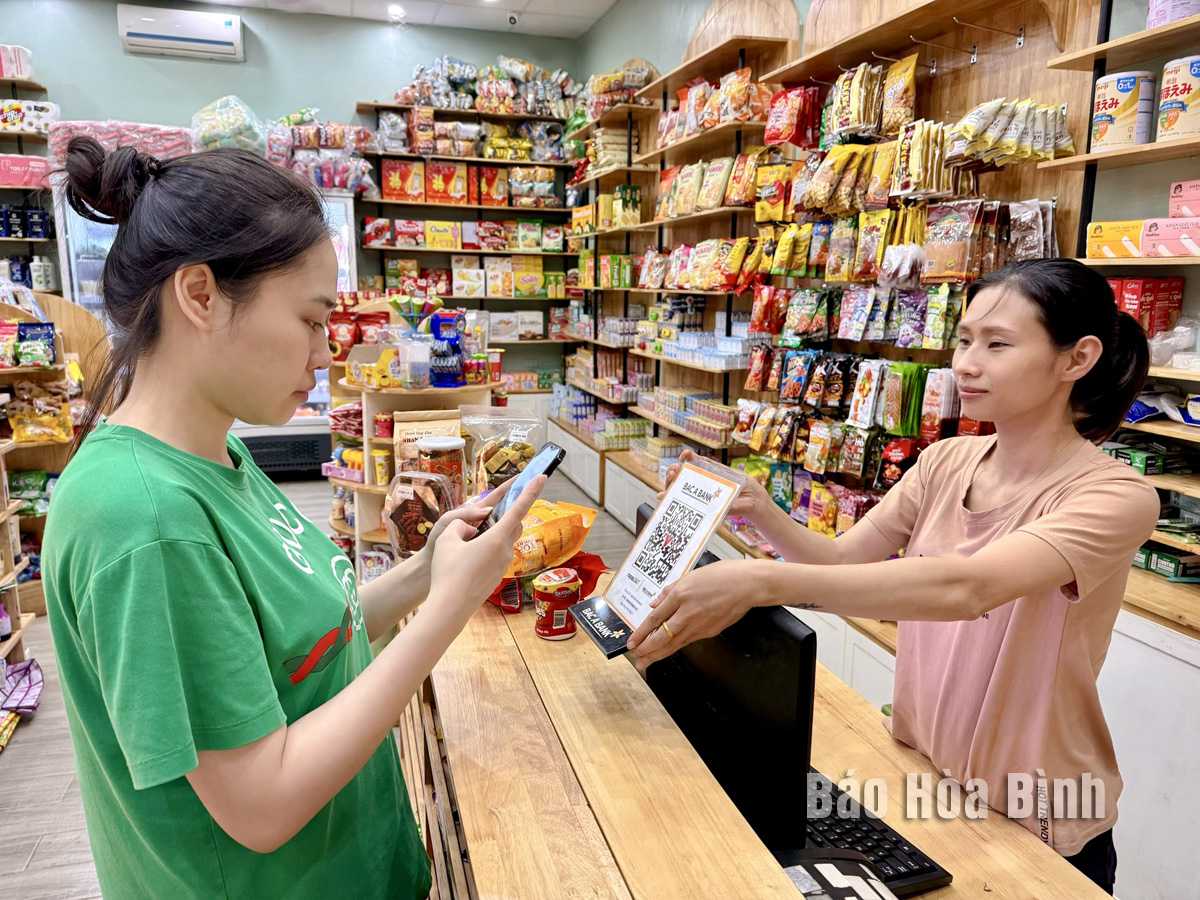
In recent years, non-cash payment has become popular in Hoa Binh province. This not only helps banks get closer to their digital banking goals but also creates many conveniences for customers.

According to the State Bank of Vietnam – Hoa Binh
branch, most business and service stores in Hoa Binh city currently accept
non-cash payment. Photo taken at Bao Anh store, Bac Tran Hung Dao urban area,
Hoa Binh city.
Non-cash payment helps limit the amount of cash in
circulation, reduce social costs, expand space, and shorten time for the
process of buying and selling goods and services.
In the medical field, non-cash payment activities have
achieved many positive results. According to a representative of the provincial
General Hospital, since the beginning of this year, thousands of patients have
made non-cash payments, a year-on-year increase of over 20%. This modern form
of payment helps patients shorten waiting times, and reduces human resources
making payments to the hospital.
Over the past years, the State Bank of Vietnam – Hoa Binh
branch (SBV Hoa Binh) has directed local credit institutions to continue
implementing solutions to promote digital transformation, with focus on
expanding non-cash payments. As a result, non-cash payment activities continue
to achieve positive results, especially in the fields of health, education and
social security.
To date, nearly 661,000 people, equivalent to over 75% of
the province’s population, have had transaction accounts at banks or other
licensed organisations. The total number of ATMs in operation is 73, and the
total number of point of sale (POS) machines is 492. The rates of customers
paying electricity and water bills through banks are over 75% and 58.6%,
respectively. And 100% of educational institutes in the province have
established a non-cash tuition fee collection system; however, the collection
of tuition fees without using cash has reached only 21.2%.
According to a representative of SBV Hoa Binh, the sector
continues to direct commercial banks in the locality to improve service quality
and effectively operate the non-cash payment equipment system; strengthen
inspections and strictly handle violations in complying with the provisions of
law and the State Bank of Vietnam; upgrade infrastructure and equipment
quality. It will also coordinate with local press agencies to regularly update
measures to identify risks, and prevent and handle violations in cashless
payment activities.
According to data from the Hoa Binh Provincial Party Committee, the industrial production index for the first six months of 2025 is estimated to have increased by 20% compared to the same period last year. This marks the highest year-on-year growth rate for this period since 2020.
In the first six months of 2025, Hoa Binh province’s export turnover was estimated at 1.145 billion USD, marking an 18.11% increase compared to the same period in 2024. Import turnover was estimated at $ 804 million, a 17.15% increase, which helped the province maintain a positive trade balance.
The lives of the ethnic minority farmers in Tan Lac district have gradually improved thanks to the new directions in agricultural production. This is a testament to the collective strength fostered through the professional associations and groups implemented by various levels of the district’s Farmers’ Union.
With the motto the "product quality comes first,” after nearly one year of establishment and operation, Muong village’s Clean Food Agricultural and Commercial Cooperative, located in Cau Hamlet, Hung Son Commune (Kim Boi district), has launched reputable, high-quality agricultural products to the market that are well-received by consumers. The products such as Muong village’s pork sausage, salt-cured chicken, and salt-cured pork hocks have gradually carved out a place in the market and they are on the path to obtaining the OCOP certification.
In the past, the phrase "bumper harvest, rock-bottom prices" was a familiar refrain for Vietnamese farmers engaged in fragmented, small-scale agriculture. But today, a new spirit is emerging across rural areas of Hoa Binh province - one of collaboration, organisation, and collective economic models that provide a stable foundation for production.
Maintaining growing area codes and packing facility codes in accordance with regulations is a mandatory requirement for agricultural products to be eligible for export. Recently, the Department of Agriculture and Environment of Hoa Binh province has intensified technical supervision of designated farming areas and packing facilities to safeguard the "green passport" that enables its products to access international markets.



